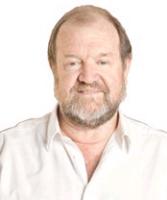
Director and Chief Investment Officer of Foord Asset Management. Dave Foord founded Foord Asset Management in 1981 with Liston Meintjes and has built it into the company it is today. He began his career at Old Mutual in 1978 and then started his business three years later.
It's not often that people who start off playing bridge together, go into business together. But when you consider Dave Foord and Liston Meintjes, conventional is not the word that comes to mind and as a niche player in the market, Foord Asset Management has enjoyed a lot of success recently. Dave Foord, owner and co-founder of Foord Asset Management, was born in Zimbabwe.
He came down to South Africa to attend Rhodes University. After qualifying as a chartered accountant, he started work at Old Mutual as an industrial analyst in 1978 where he met Liston Meintjes. Three short years later, the pair decided to start their business together. By Dave's own admission this was fairly cheeky but he had won a share competition early on, which led him to investigating companies and made him realise that this was a great way to learn about businesses before starting his own.
In Dave's mind probably one of the most important elements in investing is risk management. He believes that it is critical to manage risk — particularly the risk of being wrong. As he says, we all make mistakes but it is how we manage the mistake and limit the damage or fallout from that mistake, that differentiates the better investors from the losers.
But naturally, investing requires judgment: "The better investors have judgment. Good judgment is, however, in short supply. This results in market inefficiencies and volatility, which in turn provides better opportunities for those with a longer time horizon and better judgment. In his opinion, there are very few true experts in the field. This may or may not be surprising given the uncertainty of the future. However, he further notes, that there
are a surprising number of people who are assumed, by the public, to be experts.
Dave is not a committee man. He believes that great investors have a common thread of energy, persistence, hard work and independent thought and that for the most part individuals produce better results than teams. Dave's advice to investors is to give their investments time. A relevant quote from the Dave Foord story, Time in the Markets, is "Trees take tens of years to grow. How would they grow if you transplanted them every 28 months?"
However, he notes that long-term investing is appropriate for some investors and not for others. But he further notes that more people should be investing long term than is currently the case. Measuring returns should also involve a long time horizon. When analysing a sample of returns for statistical purposes, should that sample be based on data points measured from business cycle to business cycle, year to year or quarter to quarter?
Well, Dave's not sure, but experience tells him that you need a lot more data points to evaluate performance or skill than most managers are afforded in practice. Dave lists three things, when asked about the greatest source of value destruction in asset management: greed, costs, of which fees are a part, and short-term focus. In order to gain some semblance of respectability in the industry going forward, the industry will have to remove the dominance of the large financial service conglomerates.
He thinks that new legislation pursuing Government's retirement fund reform programme is likely to favour conglomerates over independents to the public's prejudice.
Dave has learnt some key lessons through investing that form the introduction to his book:
There is no "get-rich-quick" formula. While the markets exist in order for investors to make money, there is a cost involved in establishing market infrastructure and often your transaction costs are higher than you think. "The game is tilted against you."
Investors must recognise the difference between investing and speculating. While speculation involves the possibility of large gains, there are potentially enormous losses involved and an uncertain outcome.
Being a good investor will also involve setting a realistic investment objective and working within a budget. Market cycles do exist. One of the axioms that remain with Dave is that the market will go where it should go, but seldom when you expect it to go." Accepting that market will turn at some point can help an investor in his decision making.
Source: FinWeek
